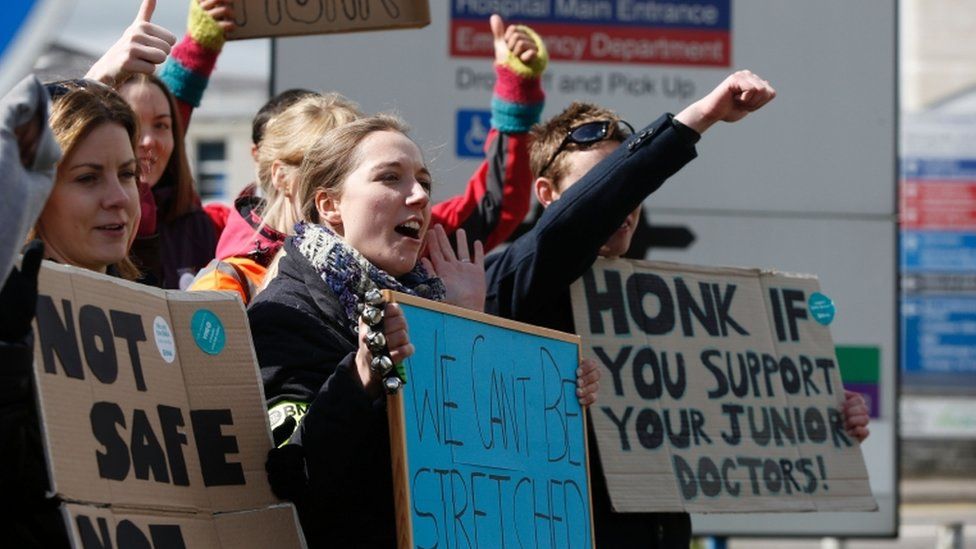Ministers and junior doctors agree to new contract talks
- Published

The Academy of Medical Royal Colleges has welcomed the agreement from the government and the British Medical Association to return to talks over the new junior doctors' contract in England.
The Academy had appealed for both sides to end the dispute after strikes and thousands of cancelled operations.
Junior doctors have been striking over plans to impose new working conditions.
Talks over the controversial new contract broke down in February.
The government has said it is willing to pause the introduction of the junior doctors' contract in England for five days from Monday to allow for talks.
But it said the doctors' union must focus discussions on outstanding contractual issues such as unsocial hours and Saturday pay.
Five-day pause
Health Secretary Jeremy Hunt indicated the government was willing to compromise.
"We've already made three significant compromises on Saturday pay but what we can't do is have a system where hospitals can't afford to roster enough doctors on a Saturday.
"That's the situation we have at the moment - about three times less medical cover at weekends."
He added: "I hope very much that the BMA will take up the offer to talk constructively."
The Prime Minister also welcomed the possibility of talks between ministers and the British Medical Association, saying it was important that the talks focussed on the "10%" of issues in the contract that had not been agreed, "particularly Saturday working".
The British Medical Association has agreed to stall any new threats of strikes - also for five days.
Dr Johann Malawana, the BMA junior doctor chairman, said: "Junior doctors have said since the outset that we want to reach a negotiated agreement, and have repeatedly urged the government to re-enter talks.
"We are keen to restart talks with an open mind.
"It is critical to find a way forward on all the outstanding issues - which are more than just pay - and hope that a new offer is made that can break the impasse."
'Way forward'
Rob Webster, from the NHS Confederation that represents NHS trusts in England, welcomed the move.
He told the BBC: "It's critical that we've now got an agreement it seems that people get back into the room and talk.
"It gives me some hope that we can get a way out of this dispute which will be good for the NHS and good for patients."
Professor Dame Sue Bailey, chair of the Academy of Medical Royal Colleges, called on both sides to end the stand-off after months of wrangling which have led to strike action.
She told the BBC said she was optimistic about the outcome of more talks.
"I think if they're in a safe space with a good senior person there from outside health, they can look at the remaining areas, the 5 to 10% cent that needs to be agreed.
"And really this has to be the way forward because, if we don't, I think in the future we will look back with regret."
Analysis
Hugh Pym, health editor, BBC News
If a week is a long time in politics, 24 hours is a long time in the junior doctors dispute.
That's the time it took for a new proposal to get the government and the BMA back to the negotiating table to emerge and then be fully analysed and accepted in principle by both sides.
At one stage in that timetable it looked as if the proposal for a five day "pause" would hit the buffers as the Government indicated it was not possible to change the process of imposing a new contract.
Then came a change of tack by ministers as they decided they could after all put imposition on hold for five days and start talking again about doctors' pay.
There is no certainty the talks will get off the ground. The BMA wants a wider agenda and details of the process have not been thrashed out.
But after three months with no talks and several strikes there is now some prospect of a way out of this dispute.
Health Secretary Jeremy Hunt had accused the BMA of refusing to negotiate over Saturday pay and said he would press on with introducing the contract.
While the BMA said there were wider unresolved issues over working hours and it was unfair to impose a contract rather than continuing discussions.
Between January and early April there were four strikes by junior doctors in England affecting routine but not urgent care.
Last week there were two one-day strikes affecting all forms of care, including emergencies - the first such action in the history of the NHS.
Only yesterday a Department of Health spokesperson was said "it is now too late to change the process of bringing in contracts".
But speaking in the House of Lords, the health minister Lord Prior of Brampton said Mr Hunt was willing to "pause" the introduction of the new contract.
However he insisted that weekend pay must be on the agenda.
Shadow health secretary Heidi Alexander welcomed the offer of a pause and said the two sides had to resume discussions.
"It is imperative that Jeremy Hunt puts his pride to one side and resumes negotiations with the BMA."
- Published5 May 2016
- Published22 April 2016
- Published25 April 2016
- Published25 April 2016